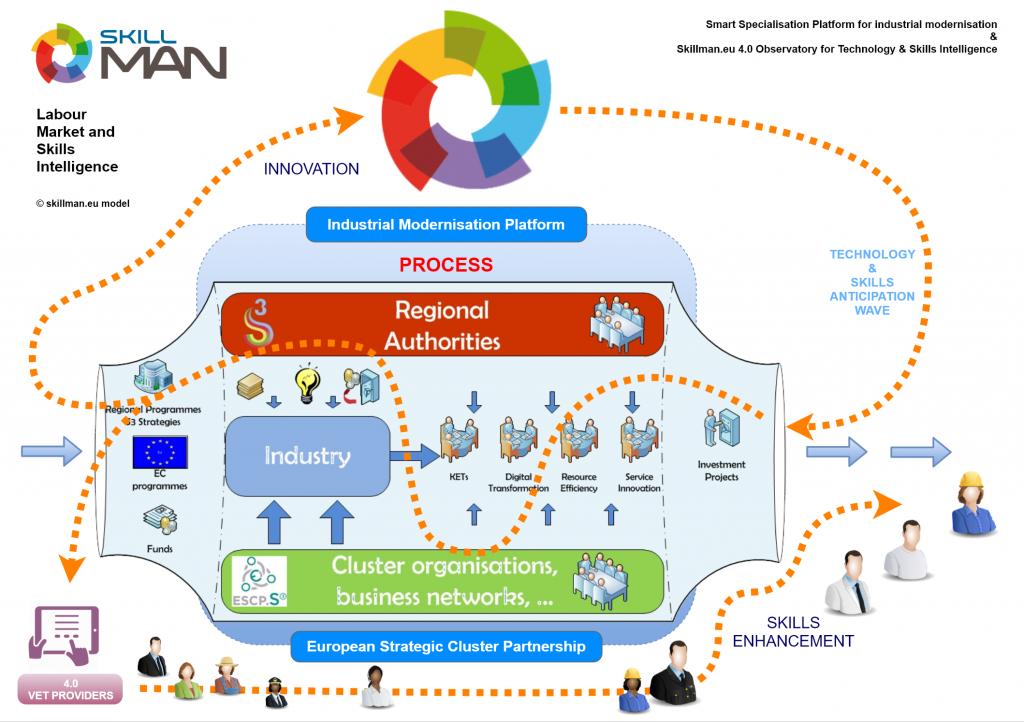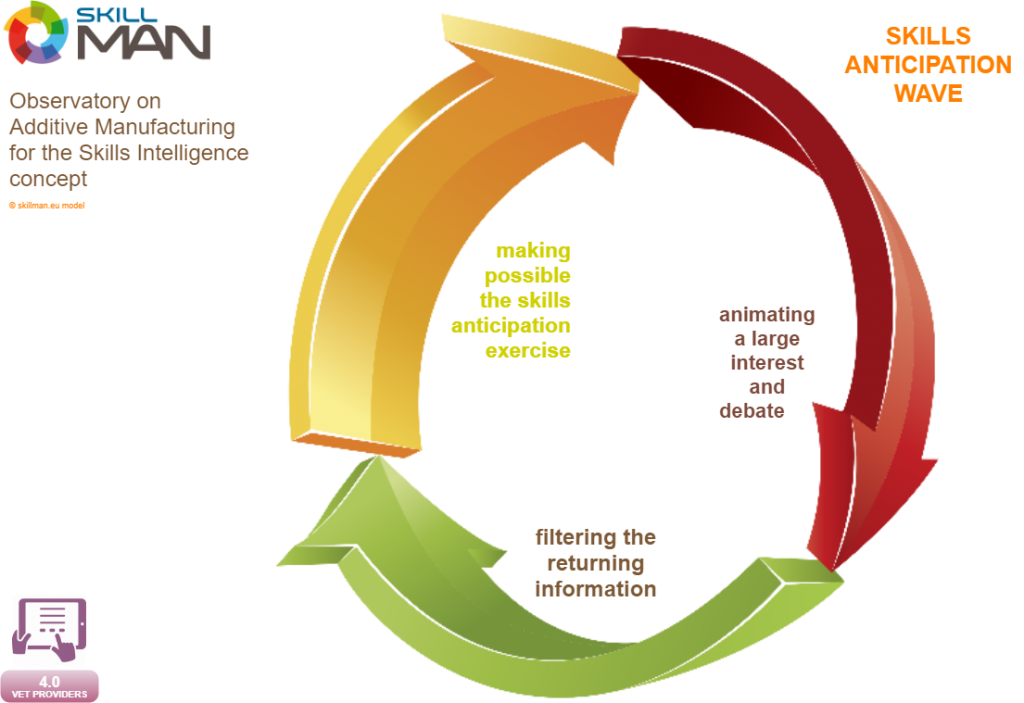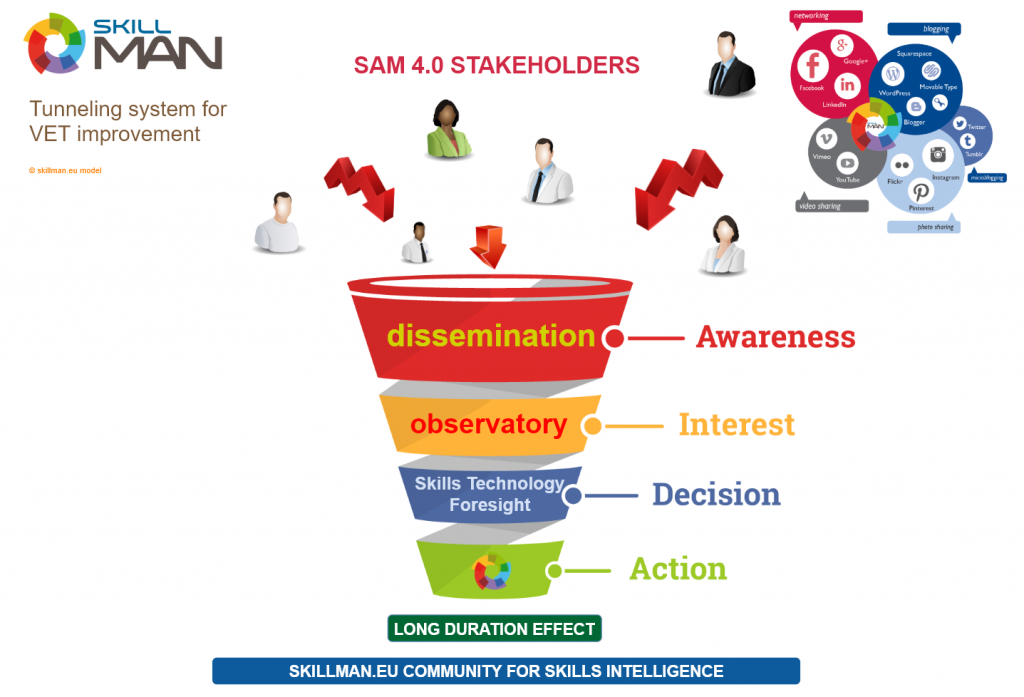The skills anticipation lifecycle that skillman.eu adopts, incorporates as one of its key components for the identification of skills needs[2], the ILO skills anticipation system[3] and it’s also ispired by the five methodological guides[4] to anticipating and matching skills and jobs, published in 2016 by Cedefop in collaboration with the ILO and ETF.
In one side, the skillman.eu Alliance produces researches that are accomplished via its research centres, though existing international networks, as well as in cooperation with and support of the extensive network of the numerous complementary organizations who have joined the skillman.eu Alliance.
In the other side the Observatory aims to actively interconnect and coordinate all the actions and results with the existing EU tools and initiatives for skills development and aims to source a large debate among stakeholders.
This process wants make tangible results such as:
- total engagement of the audience and conversion of valuable stakeholders in assets for the future sustainability as they become skillman.eu open network members
- valorisation of the skillman.eu results that are fully distributed and implemented by the industries and VET providers belonging to the engaged stakeholders
- final beneficiaries involvement, because in this process, also the learners are fully engage with various dissemination campaigns, piloting, mobility and finally personal experiences that make them more aware and attracted by the sector working opportunities.
Within this approach, each stakeholder become engaged at the moment that acquires the consciousness that the updating of the existing curricula and the learning pathways is not a one time problem. The stakeholder become engaged when decide to join the skillman.eu community realising that the need to forecast the skills is a continuous necessity and:
- It’s not just a one time problem for the company, that needs to follow rapid market changes and to continuously update his personnel
- It’s just a one time problem for the VET providers that have to respond to the needs of work giving competences for the future and for life
- It’s not just a one time problem for the learners, in a certain time of their life, because they need to plan their pathways in a lifelong learning perspective.
The researches and the stakeholders interactions are deployed within a Labour Market and Skills Intelligence European panorama that is represented by the following chart:

The skillman.eu Observatory provides the desk researches and organises a collaborative work with key stakeholders involved in focus group sessions, running with them a capacity building activity to design and anticipate the demand for skills in three perspectives:
- the short-term
- the mid-term and
- the long-term.
The Observatory identify and involve various external participants to the foresight process and pursues a very relevant dialogue among them which, in response to change, have to sit at the same table and to translate the strategic dialogue into an enhanced cooperation. The result of this interaction that skillman.eu manages among the key stakeholders is also a capacity building effect that represents an additional invaluable asset in itself.
The stakeholders are actively involved to implement the STF exercises which are organised in the three canonical ILO – SKOLKOVO’s blocks:
- designing the ‘map of the future’
- transforming the map into a set of requirements
- identifying specific practical recommendations
[2] Skills Strategies for Future Labour Markets, ILO – http://www.ilo.org/skills/areas/skills-training-for-poverty-reduction/lang–en/index.htm
[3] Sudakov, Dmitry; Luksha, Pavel; Strietska-Ilina, Olga; Gregg, Con; Hofmann, Christine; Khachatryan, Liana, Skills Technology Foresight Guide, ILO – SKOLKOVO Education Development Centre (SEDeC), June, 2016
[4] Skills for trade and economic diversification: A practical guide. ILO, 2012 / Addresses anticipation of skills needs in promoting trade strategies and in exporting industries.
Anticipating skill needs for green jobs: A practical guide. ILO, 2015a / Addresses approaches to analysing and anticipating skills needs for the green economy and sustainable development.
Guidelines for inclusion of skills aspects into employment-related analyses and policy formulation ILO, 2015b. / Addresses the analysis of skills barriers to employability and skills needs for employment, and how to integrate the analysis in the process of national employment policy formulation.
Guide to anticipating and matching skills and jobs. Cedefop, ETF, ILO, 2015: / A compendium of tools for guidance and assistance in designing methods, instruments and institutional solutions to meet the challenge of matching current and future skills and jobs:
➢ Volume 1: Using labour market information Provides guidance on the principal types of data, data sources and indicators that can answer key policy questions related to overcoming or preventing skills mismatch.
➢ Volume 2: Developing skills foresights, scenarios and forecasts Addresses quantitative and qualitative methods of anticipation and forecasting of future skills needs at a macroeconomic level.
➢ Volume 3: Working at sector level Addresses methods, processes and institutional mechanisms of skills identification and anticipation at sectoral level.
➢ Volume 4: The role of employment service providers Addresses the role of public employment services and private employment agencies in skills anticipation and matching, including the collection and use of relevant labour market information.
➢ Volume 5: Developing and running an establishment skills survey Provides guidance on the implementation of surveys among employers (establishments) on skills shortages and gaps, recruitment difficulties and training measures.
➢ Volume 6: Carrying out tracer studies Assists training providers and analysts in designing and implementing surveys among their graduates on their employability, how their skills are used, and how those skills relate to gaps on the labour market.



